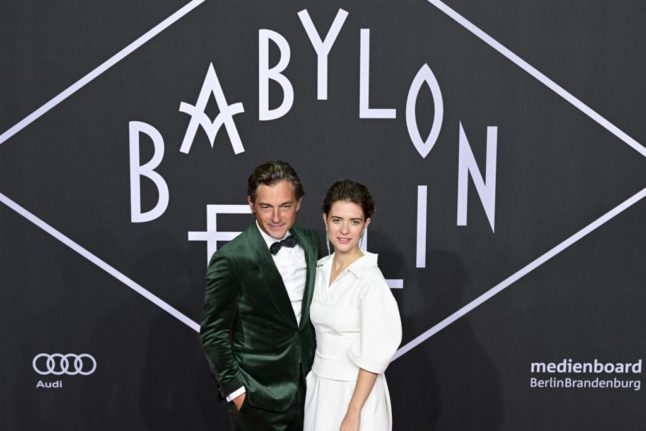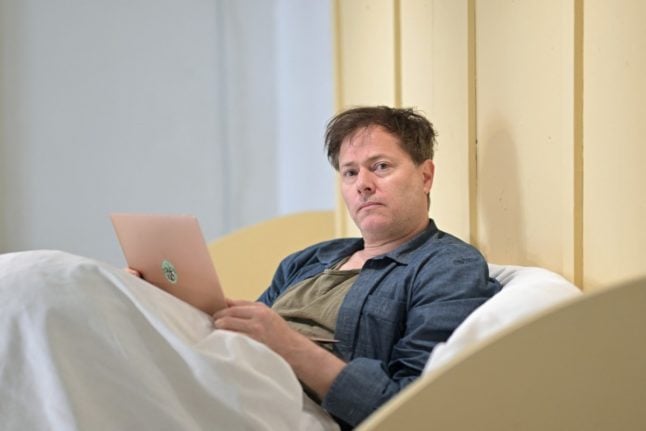In addition to sharpening your listening skills, they can also give you insight into the historical and cultural complexities of the German-speaking countries.
We’ve compiled five series and five films that will do just that.
Series:
Sam: A Saxon
This newly-released series chronicles the life of Samuel Mefirre, East Germany’s first Black policeman. Inspired by a real life story, the seven-part show follows Mefirre as he joins the police force shortly after the Berlin Wall falls, and becomes the poster boy of a reunified Germany keen to promote itself as a tolerant multicultural society. But the show doesn’t pull any punches about the racism Mefirre faced in his home country, nor about what happened when the fame and pressure became too much.
The show has been making headlines for uncovering a darker side of German society, and the real-life Mefirre, who has written an autobiography about his experiences, has praised the show for accurately capturing his story.
Watch it on: Disney +
The Empress:
This 6-part period piece tells the story of the rebellious Bavarian duchess Elisabeth and her tumultuous transition into the role of Austrian Empress after marrying Austrian Emperor Franz Joseph I. As a costume drama focused on the intrigues of European royalty, it brings shows like Bridgerton and The Crown to mind, and has received acclaim for being similarly enthralling. With a second season on the way, now is a great time to get caught up on the hype.
Watch it on: Netflix
READ ALSO: Swiss TV: The shows to watch to understand Switzerland
Babylon Berlin:
This series, based on the novels of Volker Kutscher, introduces you to the grimy underworld and tense politics of 1920s Berlin. It follows police inspector and World War I veteran Gereon Rath, who uncovers various criminal conspiracies across the show’s four seasons while battling his own demons.
In plot (a troubled former soldier navigates a city’s criminal element) and style (gritty and dark) it has drawn comparisons to the hit show Peaky Blinders. Indeed, if you like a historical drama with a bit of an edge to it, Babylon Berlin is right up your alley.
Watch it on: Sky
READ ALSO: Why ‘made in Germany’ TV has captured the imagination of the world
Charité:
As the name suggests, this show centres on the world of Berlin’s famous Charité research hospital. Each of the three seasons is set in a different time period. The first one takes place in the 1880s, the second during the 1940s, and the third in the 1960s. Classified as a character-driven soap opera with plenty of drama, the show also sheds light on some of the medical dilemmas that the hospital’s doctors faced and the important breakthroughs they spearheaded. You’ll get a mini history lesson, and a crash course in German medical vocabulary!
Watch it on: Netflix
Der Bergdoktor:
Der Bergdoktor is another medical show, but it’s set in present day Austria. It follows the story of Dr. Martin Gruber when he moves back home to the Tyrolean countryside after spending many years as a surgeon in New York. With 16 seasons on offer (having premiered in 2008) and a relaxed vibe enhanced by the beautiful scenery, it could become a nice comfort show that doubles as an introduction to the Austrian dialect.
Watch it on: ZDF
Films:
Victoria:
Victoria takes place over one chaotic night in Berlin. It begins as the titular character, a young woman who has just moved from Spain, meets and befriends a group of Berliners she meets outside a nightclub. What starts off as an endearing tale of their blossoming friendship ends in disaster for everyone, and a thrilling watch for the audience.
The movie is great for language beginners because a large portion of the dialogue is in English. It’s also a treat for film nerds: the entire movie was shot in one take, an impressive feat!
Watch it on: Netflix
Goodbye Lenin:
This 2003 ‘tragicomedy’ film has gone down as a German classic. Set in East Berlin, it follows the story of Alex, whose mother goes into a coma just before the Berlin Wall comes down. When she wakes up, he must hide the signs that communism has given way to capitalism, lest his ardently socialist mother go into shock. The film puts a humorous spin on the fall of the Wall while thoughtfully exploring the theme of Ostalgie (nostalgia for East Germany).
Watch it on: Netflix
Der Untergang (Downfall)
This Oscar-nominated film tells the story of Hitler’s crazed last days in his bunker during the 1945 Battle of Berlin. Released in 2004, it was one of the first German movies to feature an actor playing Hitler, with Bruno Ganz brilliantly depicting the dictator’s warped psychological state and its disastrous consequences.
Watch it on: Amazon Prime Video
Der Sandmann:
This surreal Swiss romantic comedy movie follows the irksome Benno, who discovers one day that he is mysteriously turning into sand. To stop this transformation, he must form a connection with his downstairs neighbour, the aspiring singer Sandra, who gets on his nerves. The film promises plenty of laughs, as well as an enjoyable immersion into Swiss German.
Watch it on: Amazon Prime Video
Schwarze Adler:
Football is the most popular sport in Germany, so naturally there are many documentaries about the “beautiful game.” One of the more interesting ones is “Schwarze Adler,” released in 2021. It examines the experiences of the Black footballers, male and female, past and present, who played in Germany, some for the national team. Told almost exclusively from their perspective, the documentary has been praised for highlighting the continued issue of racism in sport and German society.
Watch it on: Amazon Prime Video



 Please whitelist us to continue reading.
Please whitelist us to continue reading.
Member comments